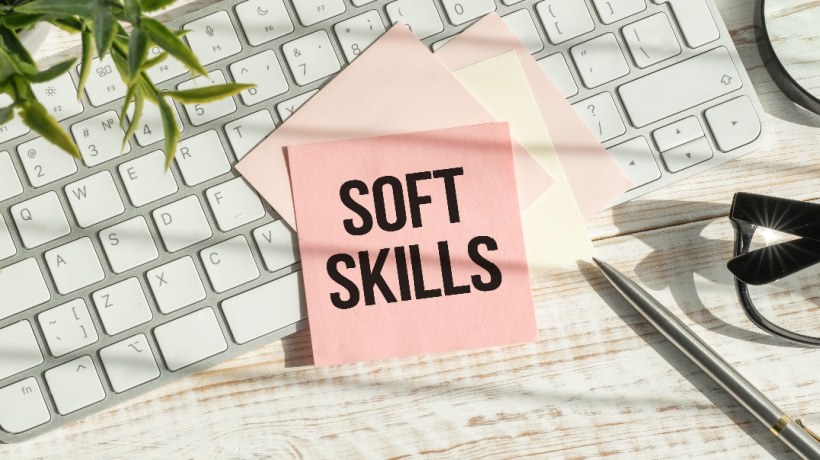The Importance Of Soft Skills In The Workplace And 5 Ways To Teach Them
You know your new hire has the hard technical skills they need to do their job. What remains a mystery is how to combine the practical knowledge they already have with the soft skills they may be lacking, especially if this job is their first or they're transitioning into a new role. As digital natives chiefly accustomed to the online world enter the workforce, soft skills training is more important than ever. Here's how you can develop soft skills in the workplace consistently and effectively.
What Are The Major Soft Skill Training Topics For Employees?
Soft skills are traditionally challenging to teach. Distinguished from the hard skills of technical knowledge and abilities, soft skills examples include:
- Communication
- Leadership
- Critical thinking
- Listening
- Adaptability
- Organization
- Teamwork
- Punctuality
Soft skills also include things like being able to get along with the people in the office and on a team by being a considerate officemate and human being. For example, while you may not get fired for consistently eating a colleague’s lunch, over time, this lack of consideration may cause supervisors to pass you over for promotions and added responsibility (and increased pay).
Essentially, soft skills are how accomplished people navigate the world. It’s how they solve problems, communicate well, and adapt to challenges in their lives.
Why Is Soft Skills Training Important?
Findings by the Stanford Research Institute International and the Carnegie Mellon Foundation found that 75% of long-term job success depends upon soft skills mastery and only 25% on technical skills.
In addition to conducting extensive research on the changing face of workplace learning, LinkedIn has led the way in identifying the most in-demand soft skills for future employees (see the previous list).
Thankfully, soft skills are highly trainable. Unlike IQ, which is largely static our whole lives, our emotional intelligence – the ability to learn and apply empathy, organization, and leadership – is malleable. The development of our emotional intelligence is nearly limitless, and it’s crucial for success in every field of business.
Even when two employees’ IQs are different, soft skills can predict which one will learn more, even beyond the ability predicted by their IQ. While all employees will improve over time and with practice, those with more highly developed soft skills are more likely to exceed their colleagues without them.
As more Millennials (and the generation behind them) enter the workforce, employers are increasingly concerned with the lack of soft skills in the pool of potential employees. Many recent college graduates have made it across the stage without ever actually holding a job, even babysitting, dog walking, or car washing.
These crucial first forays into the job market teach people the importance of being on time, organizing their responsibilities, and dealing with people of all ages and from all walks of life. Lacking this early experience, workers in 2018 experience less longevity and stability in their jobs than their counterparts from previous generations.
The ROI Of Training For Soft Skills
The ROI of training for soft skills is both qualitative and quantitative. Employees with soft skills training are better-liked, happier in their jobs, and more likely to stick with their company.
But what about the bottom line?
Researchers at Harvard University, Boston University, and University of Michigan's Ross School of Business found that workers with soft skills training are 12% more productive than those without them.
Feel like that number is low? This translates into a 256% ROI with soft skills training.
5 Ways To Teach Soft Skills To Employees
Soft skills development does not occur in a vacuum, and it doesn’t just magically occur over time. Here are 5 ways to teach your employees the soft skills they need.
1. Hire Smarter
If you are looking for new hires, look for employees with a willingness to learn more than just practical skills.
Is your potential hire eager to expand their knowledge base and be self-directed? Do they have experience problem-solving in novel situations? (Think wilderness exploration through Outward Bound or volunteer experience with AmeriCorps or another long-term volunteer commitment.)
Start with employees who want to go where you’re headed – the skillsets can come later (and are easier to train).
2. Start With A Training Needs Assessment
All good learning opportunities, no matter the skill, begin with a training needs assessment. If you don’t know your destination, you cannot map the route.
For a soft skills training needs assessment, start by asking employees to set their own goals. Are they struggling with organizing long-term projects? Do they need help working with difficult suppliers, customers, or colleagues? How would they like to grow in the company?
Start there. This engages employees and gets them personally invested in the training.
3. Find An Excellent And Intuitive Learning Management System (LMS)
Finding the best LMS for your business is crucial. An LMS helps to deliver and track your employees’ learning. The best ones can monitor progress toward your employees’ individual goals, as well as tracking licenses and certifications.
You don’t need to burden HR with these tasks. Let a Learning Management System do the heavy lifting when it comes to keeping these types of records.
4. Use The Best Learning Platforms
If your company is filled with digital natives, don’t stick them in a boardroom once a month with a three-ring binder and a PowerPoint presentation.
eLearning comes in many formats and can boost retention and buy-in from your employees. If you are trying to get the Millennials in your company the soft skills training they need, catch their attention (and keep it!) with a wide variety of online learning tools.
5. Offer Opportunities For Practice, Reflection, And Refinement
Don’t train your employees in teamwork and then give everyone individual projects.
Offer opportunities for practice and application, with plenty of time for reflection and refinement (and retraining when needed!).
Training Your Employees In Soft Skills
It can be challenging to start a training program for skills that don’t necessarily have solid lines to define them. If you don’t have much experience developing employee training, to begin with, this can make it even harder.
Don’t wait for soft skills development to occur on its own. Being proactive about this type of training can create unparalleled benefits for your employees and company as a whole.









